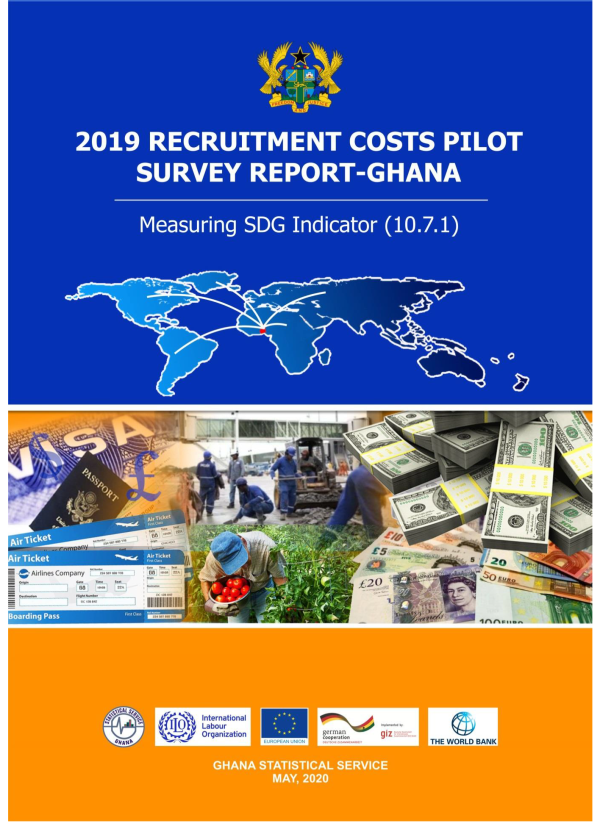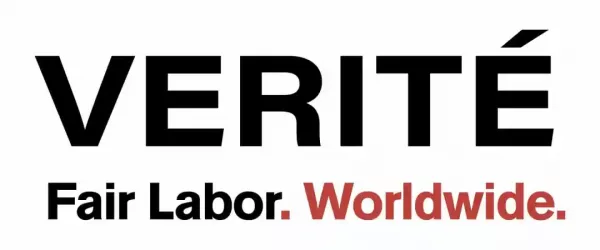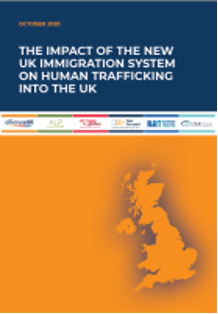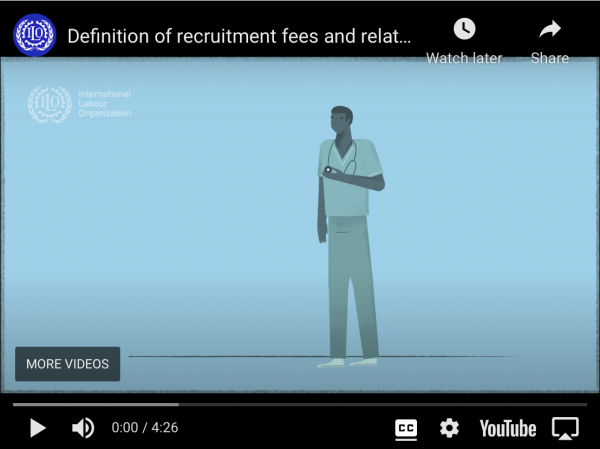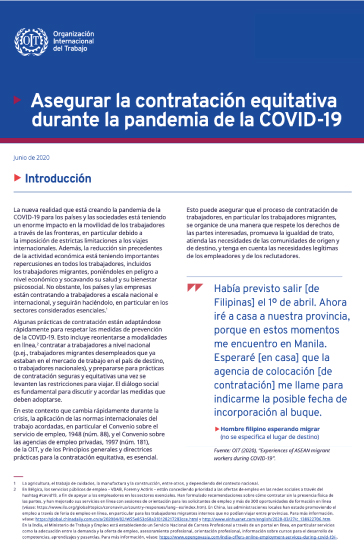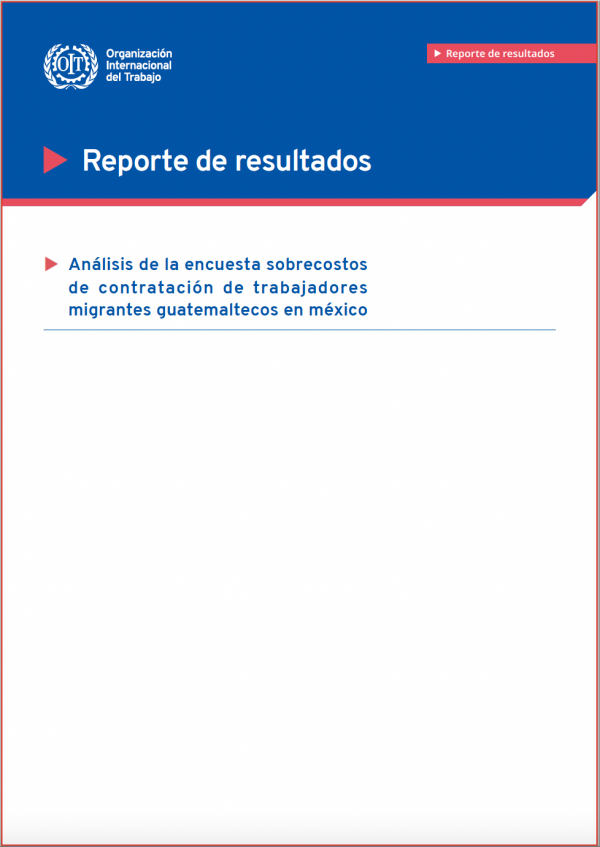2019 Recruitment Costs Pilot Survey Report-Ghana, Measuring SDG Indicator (10.7.1)
This report presents the survey results and examines the recruitment costs, monthly earnings, and Recruitment Cost Indicator (RCI) of migrant workers taking into account their socio-demographic characteristics such as age, occupation, the industry of work, educational attainment, skills, and gender.
In 2019, the Ghana Statistical Service conducted the Recruitment Cost Pilot Survey (RCPS) in four administrative districts, namely, Mampong Municipal, Asante Akim North in the Ashanti Region, and Berekum and Techiman in the Bono and Bono East regions, respectively. The study was mainly designed to pilot an ILO recommended survey methodology to collect data on recruitment costs and monthly earnings of migrant workers from purposely selected districts, in a bid to calculate the SDG indicator 10.7.1 (Recruitment Cost Indicator). This report, therefore, presents the survey results, as it examines the recruitment costs, monthly earnings, and Recruitment Cost Indicator (RCI) of migrant workers taking into account their socio-demographic characteristics such as age, occupation, the industry of work, educational attainment, skills, and sex.
The results of this pilot study show that the survey methodology adopted for this study is suitable for estimating the RCI as required for measuring the SDG indicator 10.7.1. The study shows that the RCI levels, derived from average recruitment costs and monthly earnings for migrant workers, could plausibly be a function of skill level, country of destination, or educational level of the migrant worker. This is because lower levels of RCI could be associated with highly-skilled workers, highly educated migrant workers, and developed countries due largely to commensurate high monthly earnings, a result that resonates with our a-priori expectation.
The Ghana Statistical Service (GSS) implemented the study in collaboration with the International Labour Organization (ILO) with funding from the European Union.
Type of document :
Country/Region : ,
Year of publication :
Theme : , , , ,
Verité’s Work Supporting Safe, Fair, and Legal Recruitment for Workers
Verité performs research and develops tools, guidance and approaches to support responsible recruitment and hiring.
Type of document :
Country/Region :
Year of publication :
Theme :
Verité’s CUMULUS Forced Labor Screen™
Verité’s CUMULUS Forced Labor Screen™ maps labor supply chains using patent-pending technology to gather data on workforces, recruiters, and unethical recruitment and employment practices. The membership-based platform proactively screens priority operations, supply chains, and investment portfolios for the presence of the International Labour Organization (ILO) forced labor indicators.
Type of document :
Country/Region :
Year of publication :
Theme :
Responsible Sourcing Tool
The Responsible Sourcing Tool is the result of the collaboration of four institutions committed to fighting human trafficking: the State Department’s Office to Monitor and Combat Trafficking in Persons, Verité, Made in a Free World, and the Aspen Institute.
Type of document :
Country/Region :
Year of publication :
Theme :
The Impact of the New UK Immigration System on Human Trafficking into the UK
This paper explains how the immigration system opens up the potential for human trafficking and exploitation of individuals on a massive scale globally, orchestrated by organised crime gangs, criminals, scammers, profiteers and unscrupulous employers.
Type of document :
Country/Region :
Year of publication :
Theme : , , , , , , ,
Working in the UK
A short open source, animated video particularly for use by labour providers and employers to use in inductions for workers in the UK, explaining how to avoid problems, their rights at work, and where and how to report issues, in four sections covering: Before work during recruitment; Getting the correct pay; Staying safe and well at work; Key rights at work.
Type of document :
Country/Region :
Year of publication :
Theme : , , , , , ,
Fair recruitment videos
Series of videos on fair recruitment:
The ILO General Principles for Fair Recruitment (short version)
The ILO General Principles for Fair Recruitment (long version)
Guildelines for fair recruitment of migrant labour - Governments
Guildelines for fair recruitment of migrant labour - Entreprises
The role and responsibilities of trade unions
Type of document :
Country/Region :
Year of publication :
Theme :
Definition of recruitment fees and related costs
This video outlines the definition of recruitment fees and related costs, adopted by a Tripartite Meeting of Experts, held in Geneva in November 2018. The definition recognizes the principle that workers shall not be charged directly or indirectly, in whole or in part, any fees or related costs for their recruitment. This comprehensive definition is guided by international labour standards and should be read together with the General Principles and Operational Guidelines for Fair Recruitment.
Type of document :
Country/Region :
Year of publication :
Theme : , ,
Asegurar la contratación equitativa durante la pandemia de la COVID-19
En el presente informe se destacan los principales desafíos de la contratación nacional e internacional de trabajadores durante la pandemia de la COVID-19, la respuesta de la OIT así como las políticas y medidas recomendadas. En el anexo se describen las prácticas de las partes interesadas para promover la contratación equitativa durante la pandemia de la COVID-19.
Type of document :
Country/Region :
Year of publication :
Theme : , ,
Modulo sobre costos de contratación en la EMIF Sur y prueba del indicador 10.7.1 de los ODS. Reporte de resultados
En 2019, la OIT y el COLEF colaboraron para medir los costos de contratación en los que incurrían los migrantes centroamericanos en México. Se añadió dicho módulo a la encuesta anual del COLEF (EMIF Sur). El módulo se basó en la metodología empleada por OIT-Banco Mundial para medir el Indicador de Costos de Contratación (RCI) del Objetivo de Desarrollo Sostenible 10.7.1. En este reporte se muestran los resultados de dicho ejercicio y se elaboran recomendaciones para su futura realización en otros corredores migratorios.
Type of document :
Country/Region : ,
Year of publication :
Theme : , ,
Subscribe to the Fair Recruitment Initiative Newsletter
Sign up to receive news delivered to your inbox.

